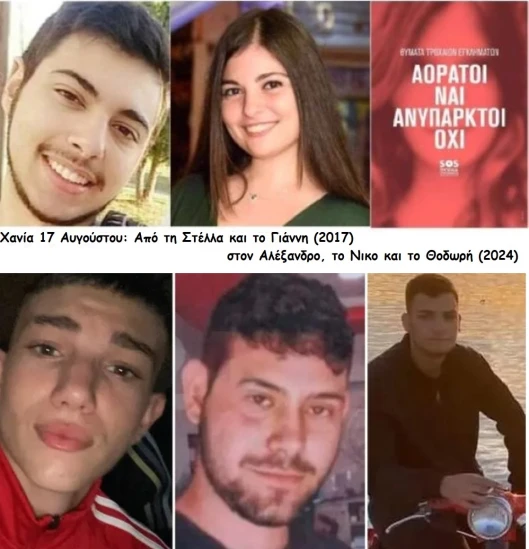
A recent tragedy on the BOAK near the Galata interchange claimed the lives of three young people, reopening the wound of Crete’s perilous road network. This has sparked a fresh round of political confrontations, with SYRIZA leader Stefanos Kasselakis criticising Prime Minister Kyriakos Mitsotakis over the government’s handling of the situation. Government spokesman Pavlos Marinakis hit back, accusing Kasselakis of exploiting the deaths for political gain.
A history of broken promises
The Hellenic Association “SOS Traffic Crimes” has been unrelenting in its criticism of the authorities’ inaction. The association points to a pattern of delayed projects and broken promises that have left Crete’s roads, particularly the BOAK, in a dangerous state.
One particularly poignant example is the case of the 2017 deaths of 19-year-olds Giannis and Stella outside the Technical University of Crete. Seven years later, the road safety measures promised in the wake of their deaths have yet to be implemented. A project to improve road safety in the area remains stalled, with only minor works completed and the more critical interventions still awaiting auction.
In a bitterly ironic twist, the Regional Governor of Crete, Stavros Arnautakis, recently announced “immediate” road safety improvements. However, “immediate” in this context has proven to mean 15-16 months, according to Finance Minister Christos Staikouras. The frustration is palpable among residents and activists alike, who see the state’s response as grossly inadequate.
A deadly status quo
Crete’s roads are notoriously dangerous, a fact underscored by the high volume of traffic, particularly during the summer months. With over a million vehicles criss-crossing the island this summer, the risk of accidents is exacerbated by a road network in dire need of repair and better oversight. The death toll, now at 40 for the year, is seen by many as a tragic but predictable outcome of systemic neglect.
Local authorities have been criticised not just for their slow response, but also for their failure to enforce existing traffic laws and to provide adequate policing. The announcement of yet another study, or the promise of future works, does little to address the immediate danger facing residents and visitors alike.
A mother’s grief
Perhaps no voice is more poignant in this debate than that of Varvara Υoran, the mother of Stella Mouschou, who was killed in the 2017 accident. In a heartbreaking statement on the anniversary of her daughter’s death, she expressed her deep frustration with the authorities. “They built a pavement to silence some voices, but seven years later, we are still waiting for justice,” she wrote. Her words echo the sentiments of many on the island, who feel that the government has prioritised political expediency over the lives of its citizens.
The association’s statement concludes with a grim observation: if the current pace of action continues, Crete’s roads will remain a minefield for years to come. The delays and excuses offered by those in power have done little to stem the tide of fatalities. Instead, they serve as a stark reminder of the cost of inaction.
As Crete mourns its latest victims, the question remains: how many more lives must be lost before the necessary steps are taken to make the island’s roads safe?
______________________________________________
Are you seeking news from Greece presented from a progressive, non-mainstream perspective? Subscribe monthly or annually to support TPP International in delivering independent reporting in English. Don’t let Greek progressive voices fade.
Make sure to reference “TPP International” and your order number as the reason for payment.